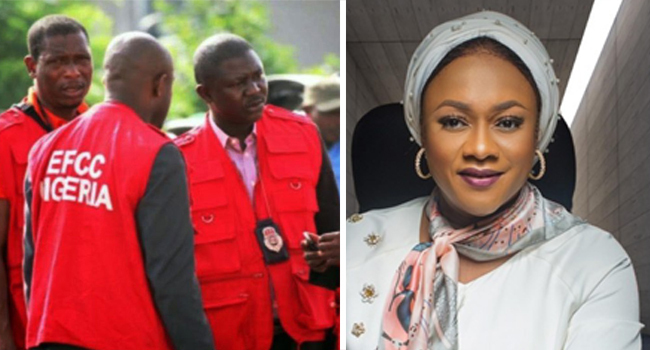
Court Orders EFCC To Release Aisha Achimugu Within 24 Hours: What’s Behind the High-Profile Case?

A recent development in a high-profile financial scandal has stirred public interest in Nigeria, as a court has mandated the Economic and Financial Crimes Commission (EFCC) to release businesswoman Aisha Achimugu within 24 hours.
This ruling, reported by Channels Television on April 30, 2025, comes amid a complex investigation involving allegations of fraud, money laundering, and a staggering $250 million tied to Lagos State Governor Babajide Sanwo-Olu’s 2027 campaign funds.
Achimugu’s legal troubles began when the EFCC arrested her on April 29, 2025, shortly after she landed at Nnamdi Azikiwe International Airport in Abuja, returning from a trip to London.
According to The Nation Newspaper, her arrest was linked to an alleged N8 billion oil block deal. The timing of her detention was notable, as it followed a Federal High Court order by Justice I.E. Ekwo, which had instructed Achimugu to appear before the EFCC and the court on April 29 and 30, respectively.
The EFCC had previously declared her wanted in March 2025, accusing her of criminal conspiracy and money laundering, among other charges.
The investigation took a dramatic turn when the EFCC uncovered luxury jewelry, cash, and other assets worth over N1 billion at Achimugu’s Abuja residence, as reported by Akelicious.
Sources claim that the $250 million in question was entrusted to Achimugu by Governor Sanwo-Olu for his re-election campaign preparations.
However, the funds reportedly went missing, leading the EFCC to freeze 136 bank accounts linked to Achimugu across multiple banks.
This revelation has sparked widespread speculation about the intersection of politics and financial misconduct in Nigeria’s elite circles.
The court’s decision to order Achimugu’s release has raised eyebrows and ignited debates online. Many X users commenting on the Channels Television post expressed skepticism about the EFCC’s handling of the case, with some alleging political interference.
For instance, @XOghre suggested the involvement of the presidency and a governor, while @Blessed
Frank called it a “powder government controlling courts.” Others, like @AdetunjiAdewolu, noted that the ruling raises questions about the EFCC’s legal processes.
This unfolding saga highlights deeper systemic issues in Nigeria’s fight against corruption, including concerns over the misuse of power, judicial independence, and the EFCC’s operational credibility.
As the case progresses, it will likely continue to draw attention, with the public eager to see whether justice will be served or if political influences will overshadow the pursuit of accountability.


